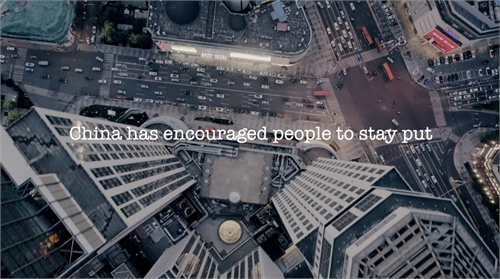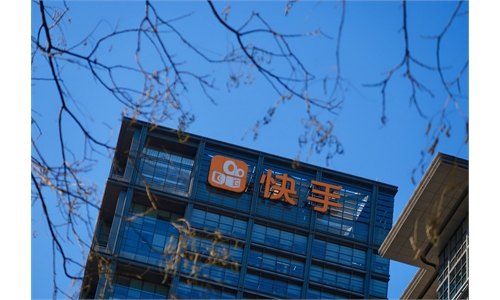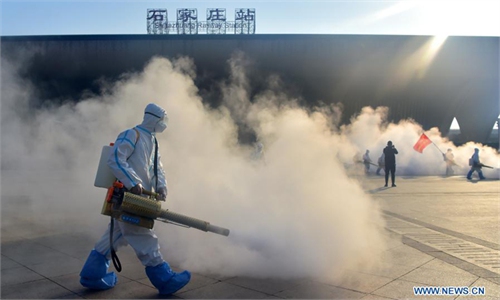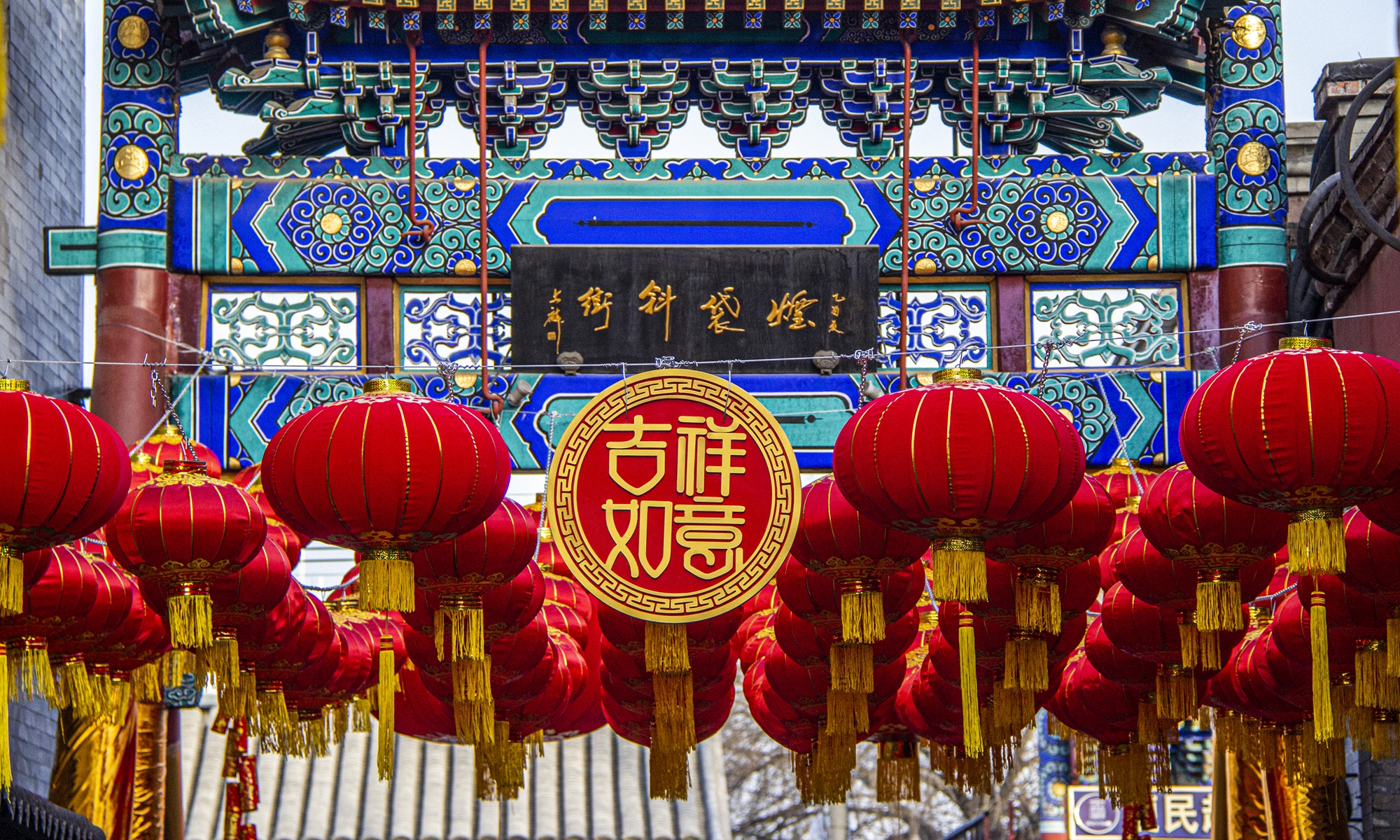
Beijing's Shichahai is decorated to celebrate Chinese Lunar New Year in Beijing on Saturday. Photo: VCG
Editor's Note:
To the Chinese, the Spring Festival, or the lunar Chinese New Year, always means many things. But the 2020 Spring Festival did not go as Wuhan people had expected. On Chinese New Year's eve last year, the city of 11 million people was locked down - unparalleled in any modern society - that lasted 76 days. People in other places across China were also kept indoors to avoid being infected.
As China has basically put the coronavirus under control, many Chinese expect the 2021 Spring Festival to be an opportunity to make up for what they missed last year - fun, leisure or time shared with family.
But the sporadic cases across China in previous months may make the 2021 Spring Festival, which falls on Friday, different as many people have chosen to stay where they work and live for the holiday instead of returning to their hometown.
How would Chinese people spend this year's Spring Festival? For those who chose to stay where they work and live, what are stories behind their decision? How does metropolis like Beijing, which used to be "empty" during Spring Festival with many leaving for their hometowns, prepare to embrace people for the holiday? The following stories may provide some answers.
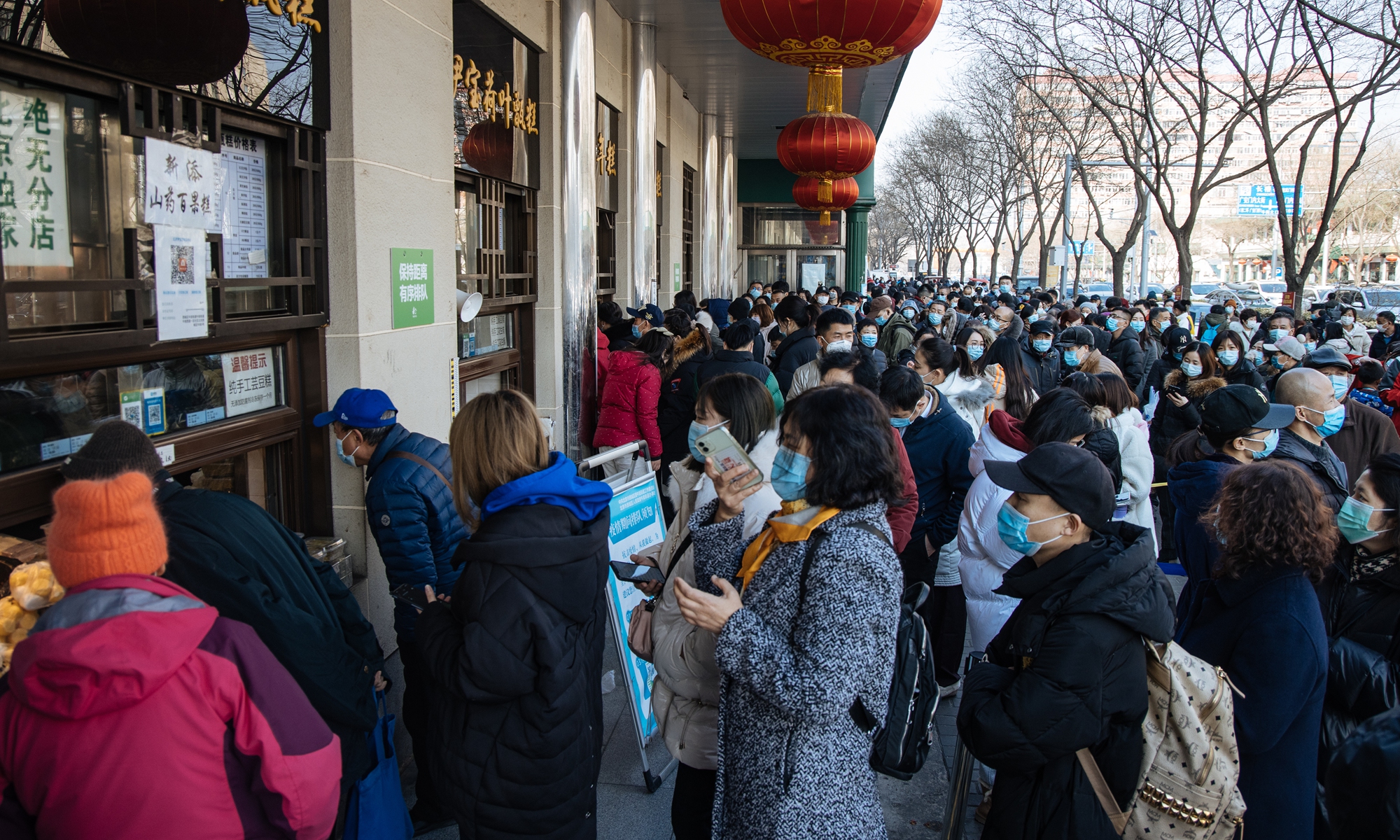
With more people spending the Spring Festival holidays in Beijing rather than going back to hometowns this year to support COVID-19 control work, Beijing's food markets are welcoming more customers than before. Photo: Li Hao/GT
Wuhan residents embrace 'quietest' Spring Festival with high alert in mind
By Zhao Yusha and Cao Siqi
The smell of preserved pork wafts through the lanes of Wuhan, and red lanterns hang on street lamps. The festive mood is brewing in the capital city of Central China's Hubei Province, but local residents said it is "the quietest Spring Festival" they have ever experienced.
After suffering from panic and agony caused by the virus, emerging from a lockdown and then moving on cautiously after life returned to normal, many Wuhan people reached by the Global Times said they will "stay put, and quietly celebrate the Spring Festival this year… We don't want to bring trouble to others or to our country."
With two Spring Festival celebrations in a row overshadowed by the coronavirus, Wuhan people this year are voluntarily choosing to avoid gatherings and maintaining social distance. As survivors of the crisis, one Wuhan resident said people in this city were affected the most, which is why they know better how to protect themselves and others.
Four days before Chinese New Year, which falls on February 12 this year, Wuhan resident Xiao Lin was shopping in the city's bustling Jiqing street in preparation for the festival. "This year it will be just my parents and me, no other relatives, as we agreed not to gather during Spring Festival," she said.
For 25-year-old Xiao, this year is "the quietest Spring Festival" she has ever spent in Wuhan, the city she grew up in. "We will have video chats with our relatives on Spring Festival eve and show them our dishes. It's actually nicer, because in the past, although we were physically together, people were still glue to their smartphones. But this year, even though we will be apart, our minds will be closer," Xiao said.
The Spring Festival is the Chinese people's most important festival, where dining together with family members is a tradition. However, one Wuhan restaurant manager surnamed Wang told the Global Times that only 40 percent of their tables have been booked. "Previously, 95 percent of our tables would have been booked by this time."
To ensure a safe but happy Spring Festival, the Wuhan city government has also rolled out a series of measures, such as preparing festive shows and tours for residents, while delivery companies will continue to operate during the holidays.
Supermarkets in Wuhan are still dotted with shoppers vying to purchase commodities for Spring Festival, while carefully obeying social distancing and wearing masks. "After all it's Chinese New Year, the viral spread started here, we have reason to celebrate, but not to let all our previous efforts go up in smoke," said Huang.
Wuhan has set its GDP growth target at 10 percent for 2021, the Xinhua News Agency reported in January. The capital city of Hubei Province managed to stage a strong economic recovery last year after its GDP shrank by 40.5 percent year on year in the first quarter due to a long lockdown to contain the epidemic.
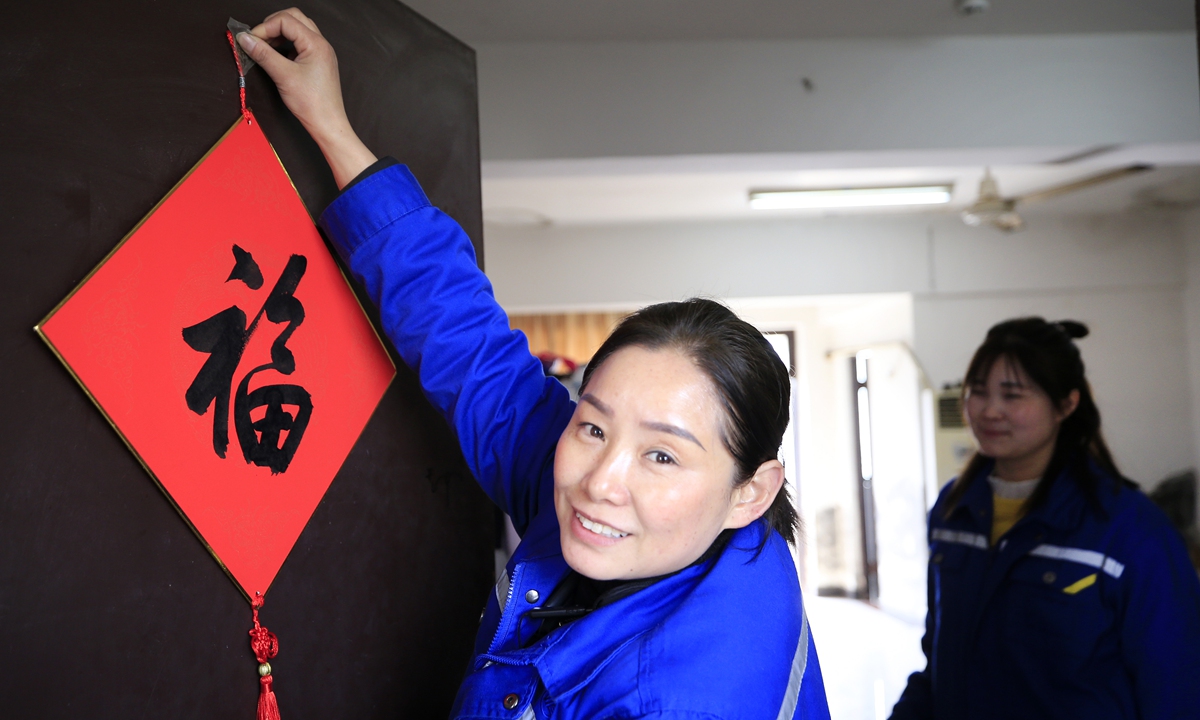
Workers who chose to stay at their factory in Shaoxing, East China's Zhejiang Province during the Spring Festival holidays decorate their dormitories on January 28. Photo: Yang Hui/GT
Stay-local policy won't hit family bond, festival mood
By Liu Xin, Huang Lanlan and Leng Shumei
Given that the 2020 Spring Festival has been spent in the shadow of the coronavirus, more Chinese people anticipated to have this year's festival with their family members. But as the sporadic cases appeared in many cities across China, they choose to stay where they work and live to celebrate another special holiday.
Liu Huan, a member of the nucleic acid testing team at the Shijingshan Maternal and Child Care Hospital, decided not to return to her hometown in Dingzhou, Hebei Province but to stay in Beijing for the upcoming Spring Festival holiday.
"Many of the medical staff in our hospital chose to stay in Beijing during the holiday although they miss their families at hometown very much. But we are still in a special period currently. If any emergencies happen, we can be right there," Liu told the Global Times.
Liu has been working in Beijing for six years and this will be the first time for Liu not spending the most important festival together with her parents. "I discussed this with my parents half a month ago and my mother agreed as it echoes the government's calls for epidemic prevention work," Liu said.
Given the sporadic cases emerged in several places around China, the country has - for the first time - called for people to stay where they work for the upcoming Spring Festival. Meanwhile, detailed measures have been rolled out to guide the public on their return journeys to their hometowns with many requiring mandatory nucleic acid tests within seven days of travel.
Liu has seen more people coming to the hospital to get nucleic acid tests in recent weeks. Many came with their whole family in order to get "passports" for their hometown reunification.
Though feeling jealousy somehow when she saw these people who would soon reunite with their loved ones, Liu persuaded herself that as soon as this round of epidemic finishes, she will meet her parents happily and safely.
The upcoming Spring Festival has added pressure for the COVID-19 prevention work across China due to the large number of trips during the travel rush - although this year has experienced a sharp decline - and in group activities.
Governments of all levels in China have issued notices discouraging gathering to avoid possible cluster infections. Many also suggested people who return to hometown monitor their health and remain indoor as much as possible.
This will be the first-ever Chinese New Year that Hu spends outside her hometown, a much quieter one than the previous lively ones she celebrated together with her parents and many relatives at their big house in Shaanxi.
Thanks to hundreds of millions of Chinese people who choose to stay put like Liu and Hu to support the national prevention work against the coronavirus, a special, but safe and warm Spring Festival may follow.
The Chinese mainland reported no new domestic cases on Sunday, according to the National Health Commission on Monday, 53 days after the latest round of outbreaks.
No new deaths or suspected domestic cases were reported, either.
The phased victory is good news for the upcoming gatherings and family reunions for the Spring Festival, but the guard must not be lowered, especially in previously virus-stricken places, which need more time to announce themselves as virus-free, observers said.
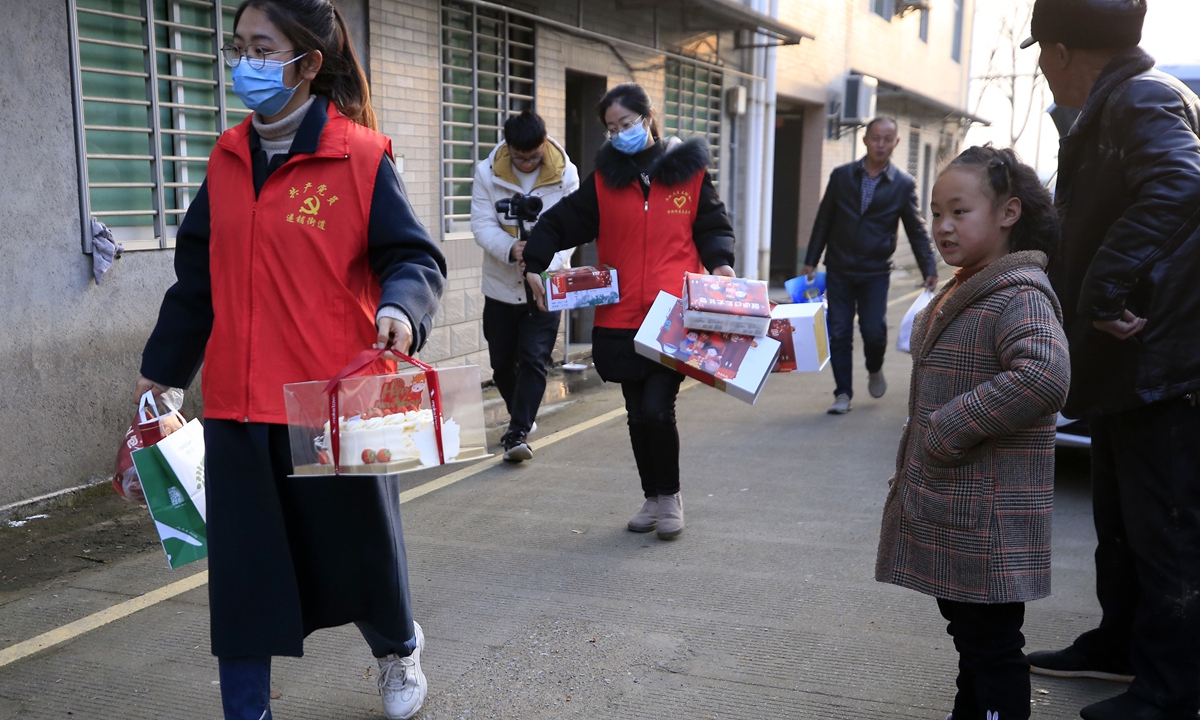
A civil servant delivers gift packages for workers who chose to stay at the city where they work during the Spring Festival holidays in Anji, East China's Zhejiang Province on February 2. Yang Hui/GT
Holiday spending glows as large-scale traffic on halt
By Ma Jingjing and Zhang Dan
As the Chinese authorities encourage people to stay put over the Spring Festival holidays to reduce the risk of an infection spike, the country's usual massive Chunyun or the Spring Festival travel rush has disappeared, which is replaced by bustling scenes of consumers across the country rushing to local supermarkets and online shopping platforms to stock up on holiday goods, offering a vivid testament to the country's economic revival.
Amid the policy suggesting people stay put in their working cities for the week-long holidays, data from online shopping platforms showed that they are gearing up for the holiday. Deliverymen who choose to stay in metropolises including Beijing and Shanghai are ready for a busy holiday.
On a chilly Tuesday morning ahead of the Spring Festival, when Beijing just woke up in a warm blanket of a rosy dawn, a group of deliverymen have been laboring for an hour sorting parcels at an express outlet in Jinzhan West, a village about a 40-minute-drive from Beijing's CBD.
Entering the yard of the outlet, a banner reading "Compared with being under quarantine at home, it's better to stay put making more money," came into sight. That's a slogan domestic express delivery firm Yunda Express uses to encourage employees to work as usual for delivery needs during the seven-day holiday period.
Tao Mingqi, a 21-year-old from Fushun, Northeast China's Liaoning Province, is one of the 20 some employees that chose to stay put to handle the exploding number of parcels.
"Recently, I generally get up at around 5:30 am and then walk 15 minutes to the outlet to start a day's work," Tao told the Global Times, noting that he may not finish his work until 9 pm on Tuesday because a colleague forgot to take a nucleic acid test and couldn't come to work, so he has to cover part of his colleague's job.

Online campaign of special purchases for 2021 Spring Festival Infographic: Deng Zijun and Chen Xia/GT
He said that he delivers about 300 parcels a day, and the overall number of parcels at the outlet increases day by day with the approaching Spring Festival when online shopping surges. Meanwhile, Yunda recently became a partner of leading e-commerce site Pinduoduo's 2021 online shopping festival, which means the courier will see a further increase in business.
"I had planned to return to my hometown this Spring Festival since I didn't go back last year, but I eventually decided to stay put as the authorities have called on us to do so," Tao said.
He said that the company offers 200 yuan ($30.96) a day as well as 0.5-1 yuan bonus per parcel during the Spring Festival as a reward. Meanwhile, the colleagues will have dinner together on the eve of the Spring Festival as a family, he said.
